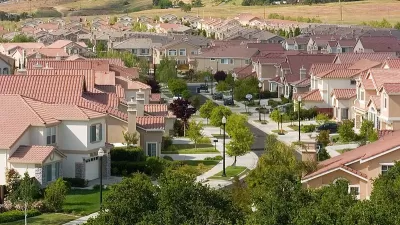Almost all the affordable housing development in L.A. in the past decade has occurred in majority-minority neighborhoods. The L.A. Department of City Planning is looking for ways to make sure high-income areas do more of their fair share.

The Los Angeles Department of City Planning (DCP) is hoping to leverage the eight-year Regional Housing Allocation (RHNA) process to ensure that affordable housing development and growth are distributed equitably across its neighborhoods.
According to an article by Steven Sharp, DCP staff co-authored a new report with the city's Housing and Community Investment Department to document the inequities of affordable housing development in L.A. over the past decade. The report also suggests short- and long-term policies designed to shift the distribution of affordable housing to more affluent parts of the city.
According to Sharp's summary of the report's finding, "over the past decade, affordable housing has been increasingly concentrated in majority-minority neighborhoods in Central and South Los Angeles, which have long been characterized by poverty and segregation." Specifically, "Just 14 percent of the city's affordable units over that time period - nearly 1,600 in total - were built in high-resource communities, compared to 62 percent in low-resource neighborhoods."
The report also blames zoning for contributing to that divide. "In high resource communities, 76 percent of residential parcels are zoned for single-family uses, with 20 percent set aside for apartments," explains Sharp. " In low resource neighborhoods, the ratio is flipped, with 80 percent of residential land zoned for apartments and just 20 reserved for single-family homes."
The policy recommendations in the report include zoning changes that target high-opportunity communities proximate to transit routes. "Additionally, the report proposes more flexible zoning and new incentives to promote the construction of so-called 'missing middle' housing in current single-family and low-density neighborhoods," reports Sharp. Also included in the report's policy recommendations: the idea of a citywide inclusionary zoning policy.
More details and recommendations are included in the source article linked below.
FULL STORY: Planning Department proposes "fair share" allocations for affordable housing

Planetizen Federal Action Tracker
A weekly monitor of how Trump’s orders and actions are impacting planners and planning in America.

Restaurant Patios Were a Pandemic Win — Why Were They so Hard to Keep?
Social distancing requirements and changes in travel patterns prompted cities to pilot new uses for street and sidewalk space. Then it got complicated.

Maui's Vacation Rental Debate Turns Ugly
Verbal attacks, misinformation campaigns and fistfights plague a high-stakes debate to convert thousands of vacation rentals into long-term housing.

In California Battle of Housing vs. Environment, Housing Just Won
A new state law significantly limits the power of CEQA, an environmental review law that served as a powerful tool for blocking new development.

Boulder Eliminates Parking Minimums Citywide
Officials estimate the cost of building a single underground parking space at up to $100,000.

Orange County, Florida Adopts Largest US “Sprawl Repair” Code
The ‘Orange Code’ seeks to rectify decades of sprawl-inducing, car-oriented development.
Urban Design for Planners 1: Software Tools
This six-course series explores essential urban design concepts using open source software and equips planners with the tools they need to participate fully in the urban design process.
Planning for Universal Design
Learn the tools for implementing Universal Design in planning regulations.
Heyer Gruel & Associates PA
JM Goldson LLC
Custer County Colorado
City of Camden Redevelopment Agency
City of Astoria
Transportation Research & Education Center (TREC) at Portland State University
Jefferson Parish Government
Camden Redevelopment Agency
City of Claremont





























